Challenges Faced by Start-ups Due to COVID-19: Annotated Bibliography
VerifiedAdded on 2022/07/29
|7
|1768
|39
Homework Assignment
AI Summary
This annotated bibliography addresses the challenges faced by start-ups due to the COVID-19 pandemic, guided by the research question: "What are the challenges faced by Start-ups due to COVID-19?" It includes summaries of several academic journal articles. These articles explore the economic impacts of the pandemic, including credit guarantees in the Eurozone, the effects of recessionary fiscal stimulus, macroeconomic implications related to supply chain disruptions and demand shortages, and the general economic implications in different countries. The bibliography highlights the importance of understanding government policies, supply chain dynamics, and fiscal measures to mitigate the adverse effects of the crisis. The papers analyzed offer insights into how start-ups can navigate the economic downturn, adapt to changing market conditions, and leverage available resources.
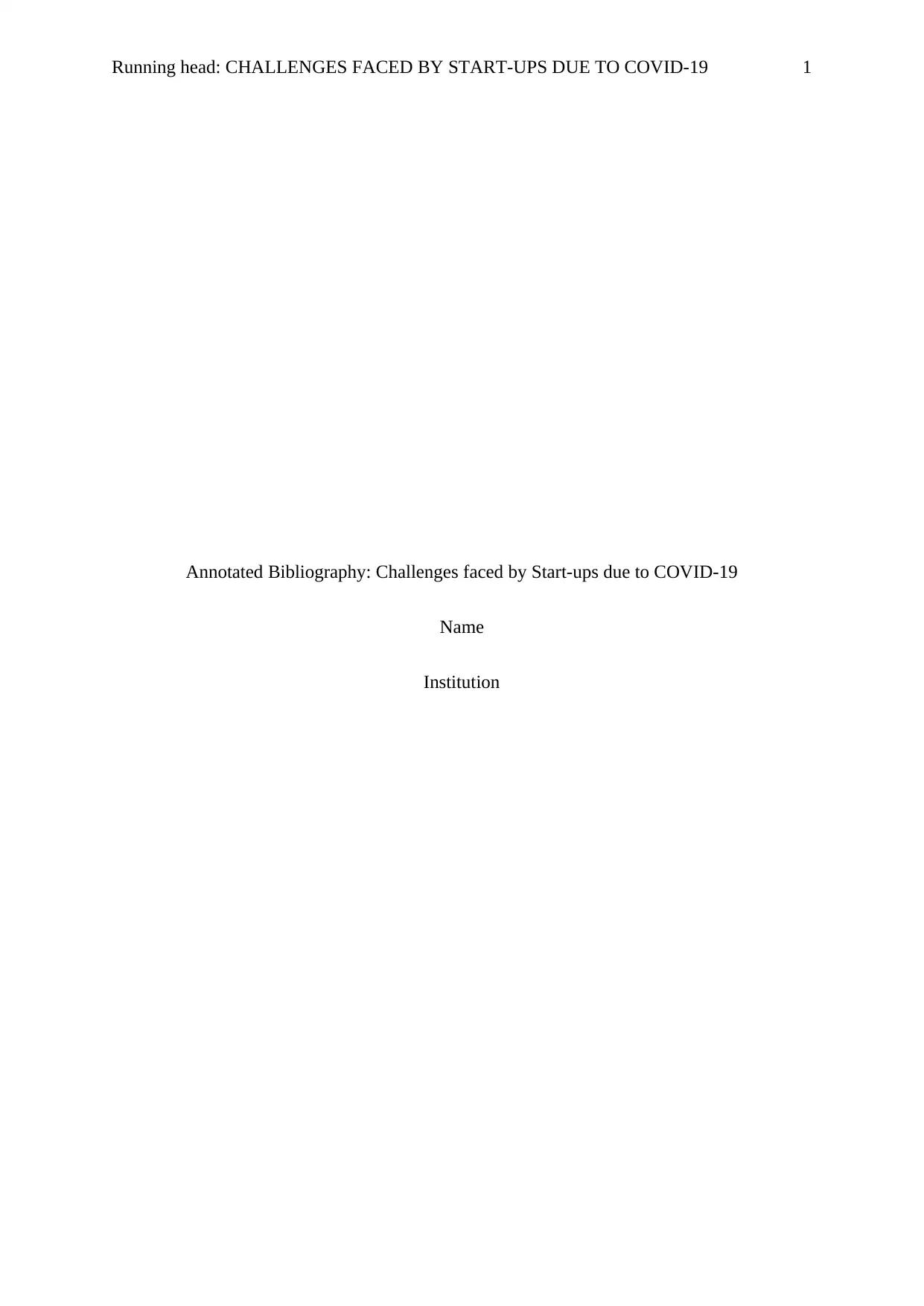
Running head: CHALLENGES FACED BY START-UPS DUE TO COVID-19 1
Annotated Bibliography: Challenges faced by Start-ups due to COVID-19
Name
Institution
Annotated Bibliography: Challenges faced by Start-ups due to COVID-19
Name
Institution
Paraphrase This Document
Need a fresh take? Get an instant paraphrase of this document with our AI Paraphraser
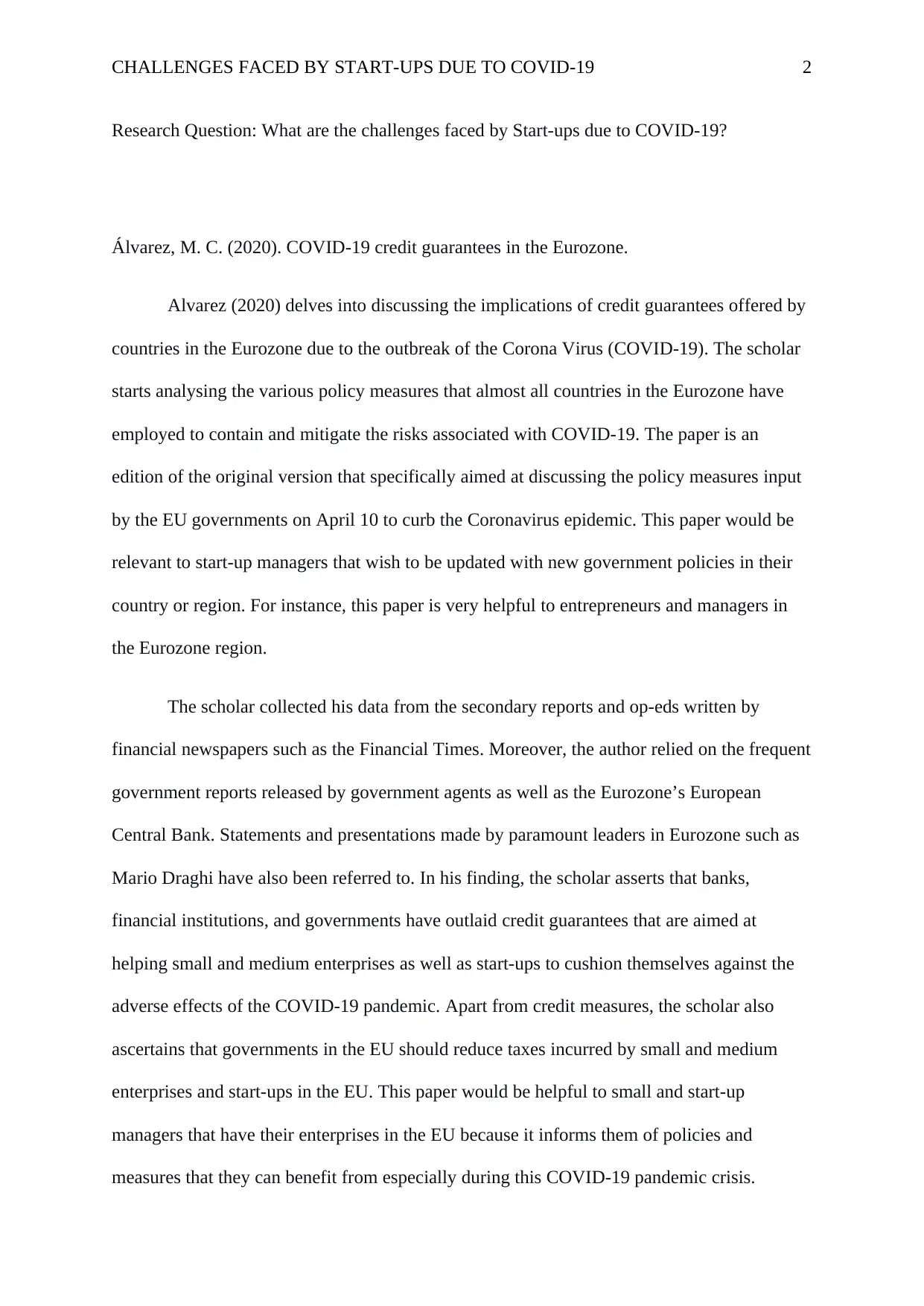
CHALLENGES FACED BY START-UPS DUE TO COVID-19 2
Research Question: What are the challenges faced by Start-ups due to COVID-19?
Álvarez, M. C. (2020). COVID-19 credit guarantees in the Eurozone.
Alvarez (2020) delves into discussing the implications of credit guarantees offered by
countries in the Eurozone due to the outbreak of the Corona Virus (COVID-19). The scholar
starts analysing the various policy measures that almost all countries in the Eurozone have
employed to contain and mitigate the risks associated with COVID-19. The paper is an
edition of the original version that specifically aimed at discussing the policy measures input
by the EU governments on April 10 to curb the Coronavirus epidemic. This paper would be
relevant to start-up managers that wish to be updated with new government policies in their
country or region. For instance, this paper is very helpful to entrepreneurs and managers in
the Eurozone region.
The scholar collected his data from the secondary reports and op-eds written by
financial newspapers such as the Financial Times. Moreover, the author relied on the frequent
government reports released by government agents as well as the Eurozone’s European
Central Bank. Statements and presentations made by paramount leaders in Eurozone such as
Mario Draghi have also been referred to. In his finding, the scholar asserts that banks,
financial institutions, and governments have outlaid credit guarantees that are aimed at
helping small and medium enterprises as well as start-ups to cushion themselves against the
adverse effects of the COVID-19 pandemic. Apart from credit measures, the scholar also
ascertains that governments in the EU should reduce taxes incurred by small and medium
enterprises and start-ups in the EU. This paper would be helpful to small and start-up
managers that have their enterprises in the EU because it informs them of policies and
measures that they can benefit from especially during this COVID-19 pandemic crisis.
Research Question: What are the challenges faced by Start-ups due to COVID-19?
Álvarez, M. C. (2020). COVID-19 credit guarantees in the Eurozone.
Alvarez (2020) delves into discussing the implications of credit guarantees offered by
countries in the Eurozone due to the outbreak of the Corona Virus (COVID-19). The scholar
starts analysing the various policy measures that almost all countries in the Eurozone have
employed to contain and mitigate the risks associated with COVID-19. The paper is an
edition of the original version that specifically aimed at discussing the policy measures input
by the EU governments on April 10 to curb the Coronavirus epidemic. This paper would be
relevant to start-up managers that wish to be updated with new government policies in their
country or region. For instance, this paper is very helpful to entrepreneurs and managers in
the Eurozone region.
The scholar collected his data from the secondary reports and op-eds written by
financial newspapers such as the Financial Times. Moreover, the author relied on the frequent
government reports released by government agents as well as the Eurozone’s European
Central Bank. Statements and presentations made by paramount leaders in Eurozone such as
Mario Draghi have also been referred to. In his finding, the scholar asserts that banks,
financial institutions, and governments have outlaid credit guarantees that are aimed at
helping small and medium enterprises as well as start-ups to cushion themselves against the
adverse effects of the COVID-19 pandemic. Apart from credit measures, the scholar also
ascertains that governments in the EU should reduce taxes incurred by small and medium
enterprises and start-ups in the EU. This paper would be helpful to small and start-up
managers that have their enterprises in the EU because it informs them of policies and
measures that they can benefit from especially during this COVID-19 pandemic crisis.
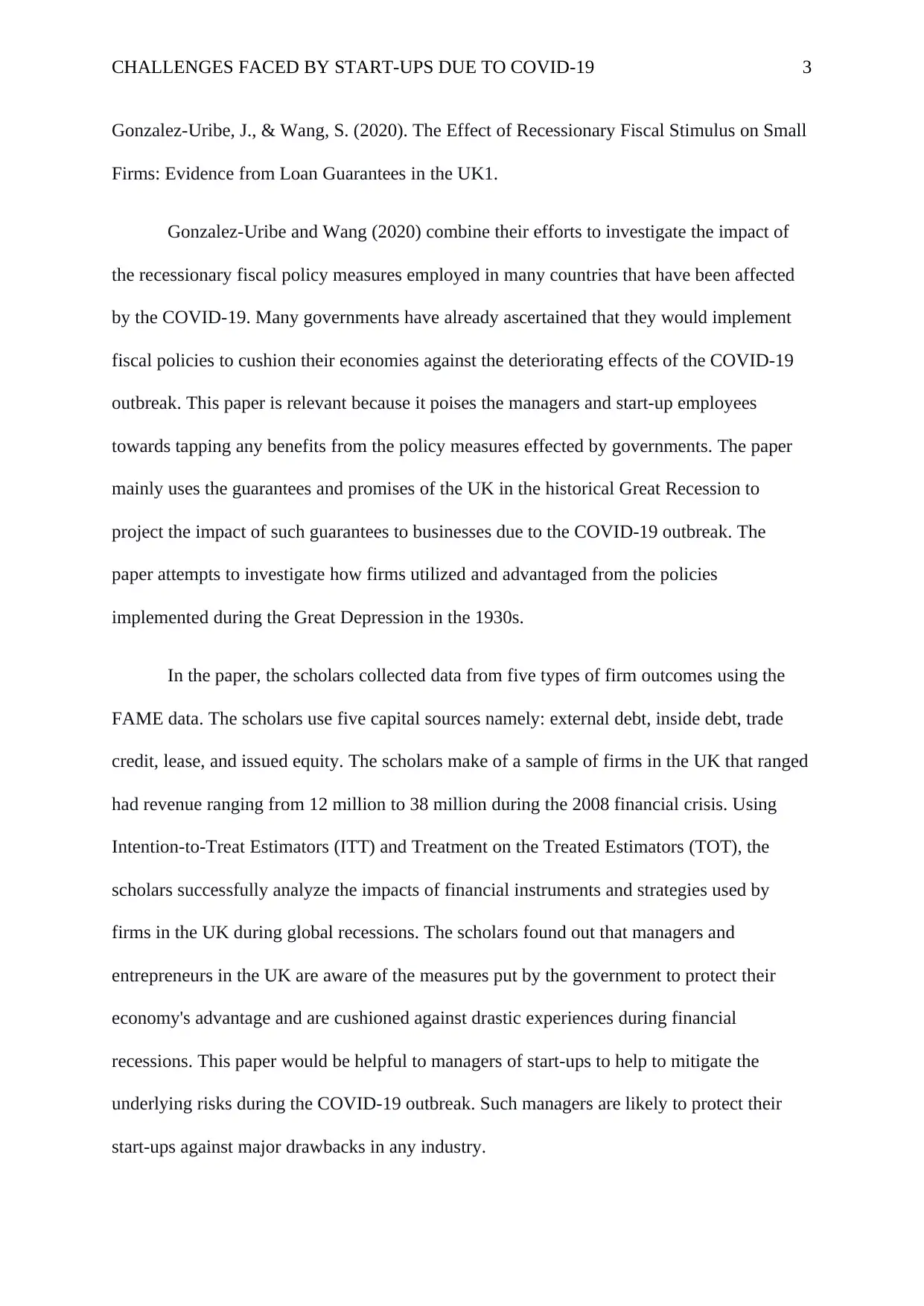
CHALLENGES FACED BY START-UPS DUE TO COVID-19 3
Gonzalez-Uribe, J., & Wang, S. (2020). The Effect of Recessionary Fiscal Stimulus on Small
Firms: Evidence from Loan Guarantees in the UK1.
Gonzalez-Uribe and Wang (2020) combine their efforts to investigate the impact of
the recessionary fiscal policy measures employed in many countries that have been affected
by the COVID-19. Many governments have already ascertained that they would implement
fiscal policies to cushion their economies against the deteriorating effects of the COVID-19
outbreak. This paper is relevant because it poises the managers and start-up employees
towards tapping any benefits from the policy measures effected by governments. The paper
mainly uses the guarantees and promises of the UK in the historical Great Recession to
project the impact of such guarantees to businesses due to the COVID-19 outbreak. The
paper attempts to investigate how firms utilized and advantaged from the policies
implemented during the Great Depression in the 1930s.
In the paper, the scholars collected data from five types of firm outcomes using the
FAME data. The scholars use five capital sources namely: external debt, inside debt, trade
credit, lease, and issued equity. The scholars make of a sample of firms in the UK that ranged
had revenue ranging from 12 million to 38 million during the 2008 financial crisis. Using
Intention-to-Treat Estimators (ITT) and Treatment on the Treated Estimators (TOT), the
scholars successfully analyze the impacts of financial instruments and strategies used by
firms in the UK during global recessions. The scholars found out that managers and
entrepreneurs in the UK are aware of the measures put by the government to protect their
economy's advantage and are cushioned against drastic experiences during financial
recessions. This paper would be helpful to managers of start-ups to help to mitigate the
underlying risks during the COVID-19 outbreak. Such managers are likely to protect their
start-ups against major drawbacks in any industry.
Gonzalez-Uribe, J., & Wang, S. (2020). The Effect of Recessionary Fiscal Stimulus on Small
Firms: Evidence from Loan Guarantees in the UK1.
Gonzalez-Uribe and Wang (2020) combine their efforts to investigate the impact of
the recessionary fiscal policy measures employed in many countries that have been affected
by the COVID-19. Many governments have already ascertained that they would implement
fiscal policies to cushion their economies against the deteriorating effects of the COVID-19
outbreak. This paper is relevant because it poises the managers and start-up employees
towards tapping any benefits from the policy measures effected by governments. The paper
mainly uses the guarantees and promises of the UK in the historical Great Recession to
project the impact of such guarantees to businesses due to the COVID-19 outbreak. The
paper attempts to investigate how firms utilized and advantaged from the policies
implemented during the Great Depression in the 1930s.
In the paper, the scholars collected data from five types of firm outcomes using the
FAME data. The scholars use five capital sources namely: external debt, inside debt, trade
credit, lease, and issued equity. The scholars make of a sample of firms in the UK that ranged
had revenue ranging from 12 million to 38 million during the 2008 financial crisis. Using
Intention-to-Treat Estimators (ITT) and Treatment on the Treated Estimators (TOT), the
scholars successfully analyze the impacts of financial instruments and strategies used by
firms in the UK during global recessions. The scholars found out that managers and
entrepreneurs in the UK are aware of the measures put by the government to protect their
economy's advantage and are cushioned against drastic experiences during financial
recessions. This paper would be helpful to managers of start-ups to help to mitigate the
underlying risks during the COVID-19 outbreak. Such managers are likely to protect their
start-ups against major drawbacks in any industry.
⊘ This is a preview!⊘
Do you want full access?
Subscribe today to unlock all pages.

Trusted by 1+ million students worldwide
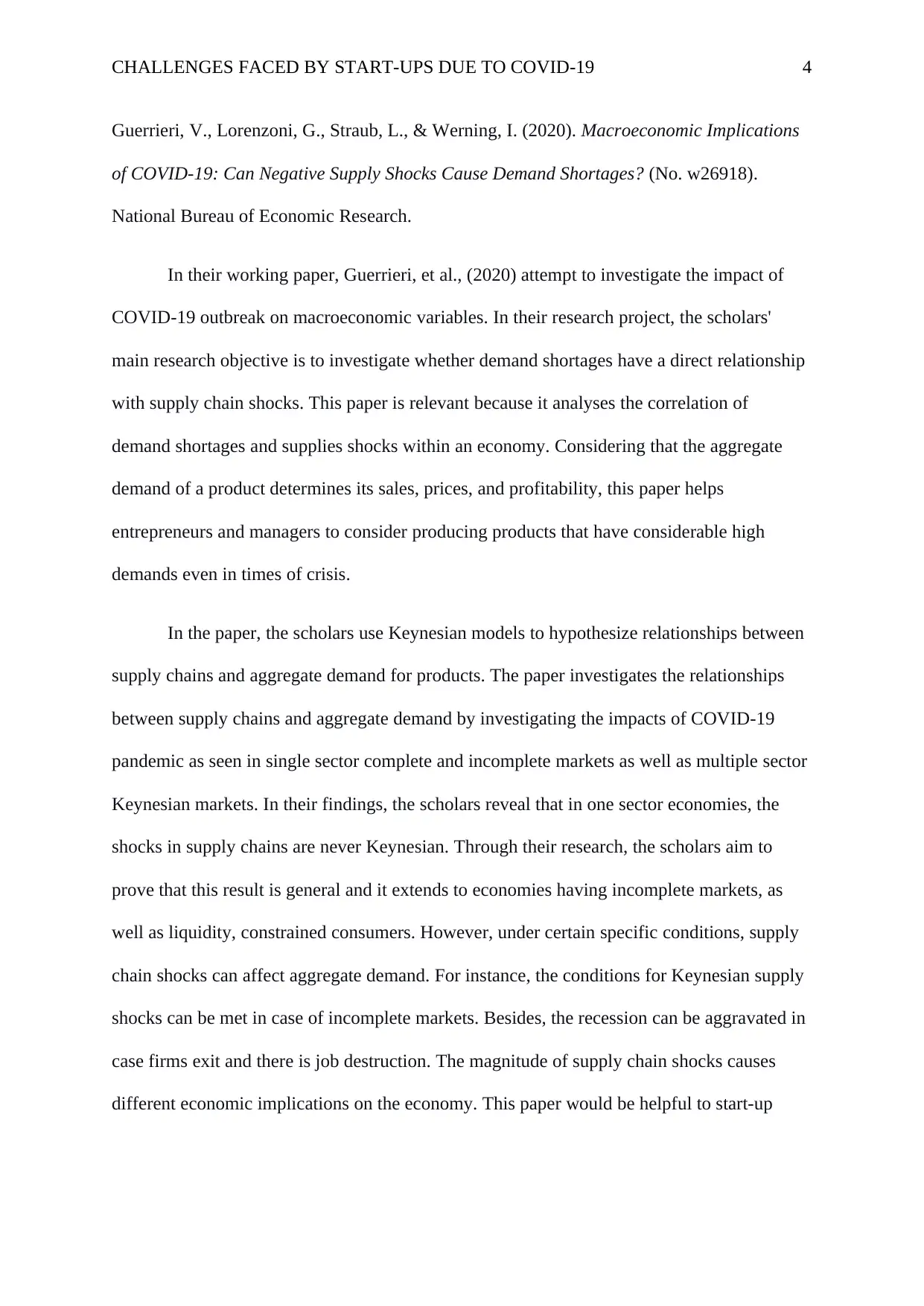
CHALLENGES FACED BY START-UPS DUE TO COVID-19 4
Guerrieri, V., Lorenzoni, G., Straub, L., & Werning, I. (2020). Macroeconomic Implications
of COVID-19: Can Negative Supply Shocks Cause Demand Shortages? (No. w26918).
National Bureau of Economic Research.
In their working paper, Guerrieri, et al., (2020) attempt to investigate the impact of
COVID-19 outbreak on macroeconomic variables. In their research project, the scholars'
main research objective is to investigate whether demand shortages have a direct relationship
with supply chain shocks. This paper is relevant because it analyses the correlation of
demand shortages and supplies shocks within an economy. Considering that the aggregate
demand of a product determines its sales, prices, and profitability, this paper helps
entrepreneurs and managers to consider producing products that have considerable high
demands even in times of crisis.
In the paper, the scholars use Keynesian models to hypothesize relationships between
supply chains and aggregate demand for products. The paper investigates the relationships
between supply chains and aggregate demand by investigating the impacts of COVID-19
pandemic as seen in single sector complete and incomplete markets as well as multiple sector
Keynesian markets. In their findings, the scholars reveal that in one sector economies, the
shocks in supply chains are never Keynesian. Through their research, the scholars aim to
prove that this result is general and it extends to economies having incomplete markets, as
well as liquidity, constrained consumers. However, under certain specific conditions, supply
chain shocks can affect aggregate demand. For instance, the conditions for Keynesian supply
shocks can be met in case of incomplete markets. Besides, the recession can be aggravated in
case firms exit and there is job destruction. The magnitude of supply chain shocks causes
different economic implications on the economy. This paper would be helpful to start-up
Guerrieri, V., Lorenzoni, G., Straub, L., & Werning, I. (2020). Macroeconomic Implications
of COVID-19: Can Negative Supply Shocks Cause Demand Shortages? (No. w26918).
National Bureau of Economic Research.
In their working paper, Guerrieri, et al., (2020) attempt to investigate the impact of
COVID-19 outbreak on macroeconomic variables. In their research project, the scholars'
main research objective is to investigate whether demand shortages have a direct relationship
with supply chain shocks. This paper is relevant because it analyses the correlation of
demand shortages and supplies shocks within an economy. Considering that the aggregate
demand of a product determines its sales, prices, and profitability, this paper helps
entrepreneurs and managers to consider producing products that have considerable high
demands even in times of crisis.
In the paper, the scholars use Keynesian models to hypothesize relationships between
supply chains and aggregate demand for products. The paper investigates the relationships
between supply chains and aggregate demand by investigating the impacts of COVID-19
pandemic as seen in single sector complete and incomplete markets as well as multiple sector
Keynesian markets. In their findings, the scholars reveal that in one sector economies, the
shocks in supply chains are never Keynesian. Through their research, the scholars aim to
prove that this result is general and it extends to economies having incomplete markets, as
well as liquidity, constrained consumers. However, under certain specific conditions, supply
chain shocks can affect aggregate demand. For instance, the conditions for Keynesian supply
shocks can be met in case of incomplete markets. Besides, the recession can be aggravated in
case firms exit and there is job destruction. The magnitude of supply chain shocks causes
different economic implications on the economy. This paper would be helpful to start-up
Paraphrase This Document
Need a fresh take? Get an instant paraphrase of this document with our AI Paraphraser
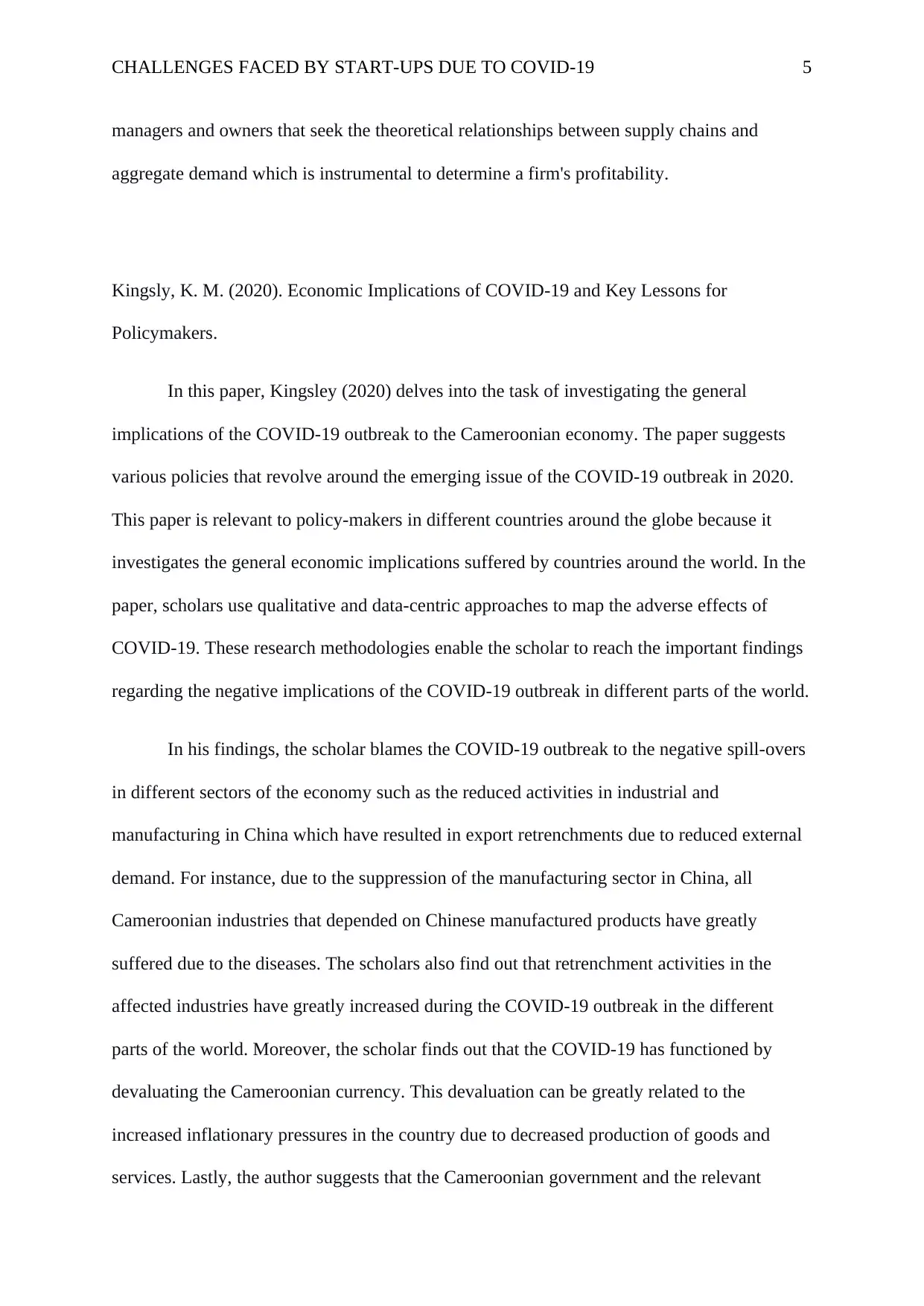
CHALLENGES FACED BY START-UPS DUE TO COVID-19 5
managers and owners that seek the theoretical relationships between supply chains and
aggregate demand which is instrumental to determine a firm's profitability.
Kingsly, K. M. (2020). Economic Implications of COVID-19 and Key Lessons for
Policymakers.
In this paper, Kingsley (2020) delves into the task of investigating the general
implications of the COVID-19 outbreak to the Cameroonian economy. The paper suggests
various policies that revolve around the emerging issue of the COVID-19 outbreak in 2020.
This paper is relevant to policy-makers in different countries around the globe because it
investigates the general economic implications suffered by countries around the world. In the
paper, scholars use qualitative and data-centric approaches to map the adverse effects of
COVID-19. These research methodologies enable the scholar to reach the important findings
regarding the negative implications of the COVID-19 outbreak in different parts of the world.
In his findings, the scholar blames the COVID-19 outbreak to the negative spill-overs
in different sectors of the economy such as the reduced activities in industrial and
manufacturing in China which have resulted in export retrenchments due to reduced external
demand. For instance, due to the suppression of the manufacturing sector in China, all
Cameroonian industries that depended on Chinese manufactured products have greatly
suffered due to the diseases. The scholars also find out that retrenchment activities in the
affected industries have greatly increased during the COVID-19 outbreak in the different
parts of the world. Moreover, the scholar finds out that the COVID-19 has functioned by
devaluating the Cameroonian currency. This devaluation can be greatly related to the
increased inflationary pressures in the country due to decreased production of goods and
services. Lastly, the author suggests that the Cameroonian government and the relevant
managers and owners that seek the theoretical relationships between supply chains and
aggregate demand which is instrumental to determine a firm's profitability.
Kingsly, K. M. (2020). Economic Implications of COVID-19 and Key Lessons for
Policymakers.
In this paper, Kingsley (2020) delves into the task of investigating the general
implications of the COVID-19 outbreak to the Cameroonian economy. The paper suggests
various policies that revolve around the emerging issue of the COVID-19 outbreak in 2020.
This paper is relevant to policy-makers in different countries around the globe because it
investigates the general economic implications suffered by countries around the world. In the
paper, scholars use qualitative and data-centric approaches to map the adverse effects of
COVID-19. These research methodologies enable the scholar to reach the important findings
regarding the negative implications of the COVID-19 outbreak in different parts of the world.
In his findings, the scholar blames the COVID-19 outbreak to the negative spill-overs
in different sectors of the economy such as the reduced activities in industrial and
manufacturing in China which have resulted in export retrenchments due to reduced external
demand. For instance, due to the suppression of the manufacturing sector in China, all
Cameroonian industries that depended on Chinese manufactured products have greatly
suffered due to the diseases. The scholars also find out that retrenchment activities in the
affected industries have greatly increased during the COVID-19 outbreak in the different
parts of the world. Moreover, the scholar finds out that the COVID-19 has functioned by
devaluating the Cameroonian currency. This devaluation can be greatly related to the
increased inflationary pressures in the country due to decreased production of goods and
services. Lastly, the author suggests that the Cameroonian government and the relevant
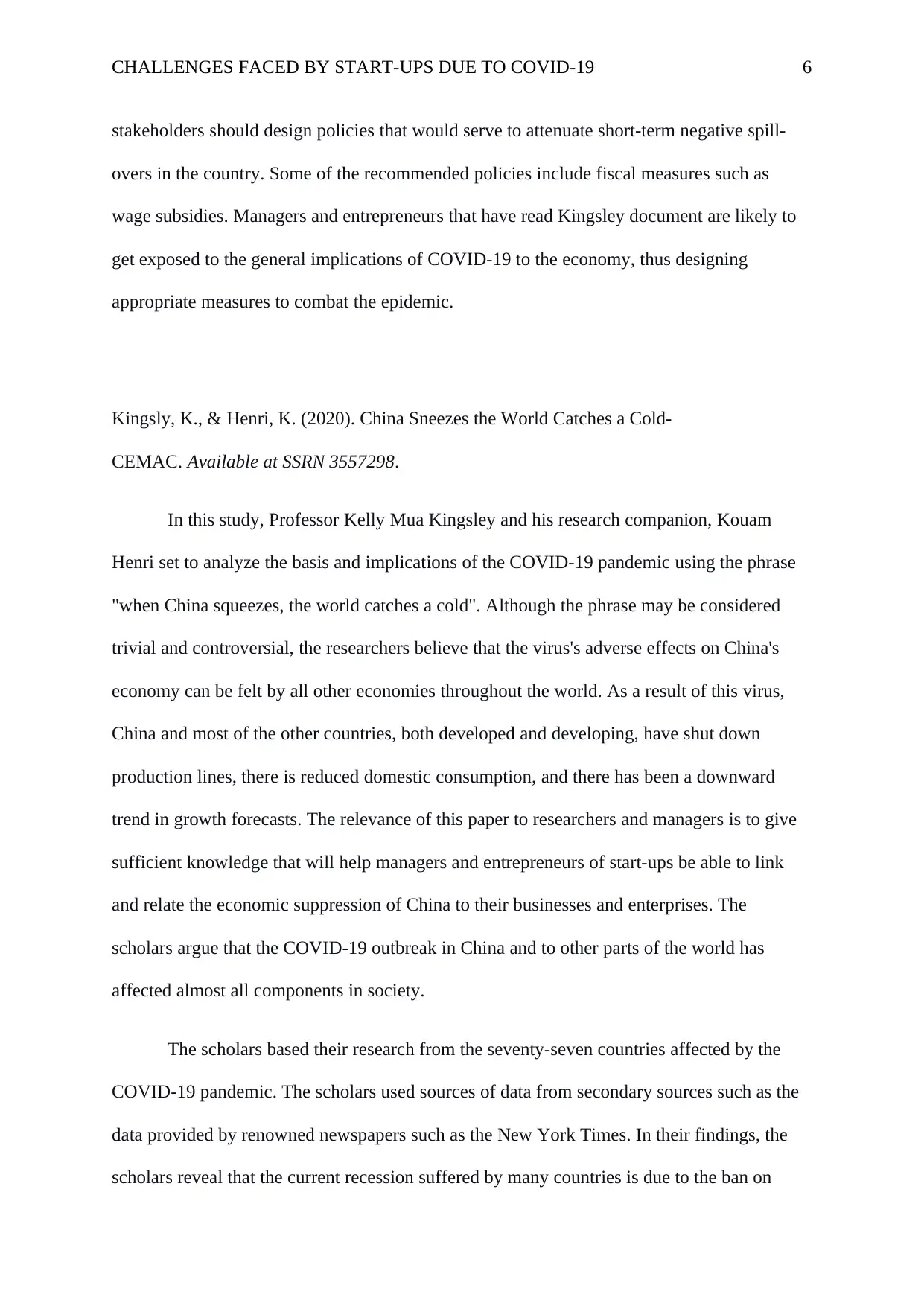
CHALLENGES FACED BY START-UPS DUE TO COVID-19 6
stakeholders should design policies that would serve to attenuate short-term negative spill-
overs in the country. Some of the recommended policies include fiscal measures such as
wage subsidies. Managers and entrepreneurs that have read Kingsley document are likely to
get exposed to the general implications of COVID-19 to the economy, thus designing
appropriate measures to combat the epidemic.
Kingsly, K., & Henri, K. (2020). China Sneezes the World Catches a Cold-
CEMAC. Available at SSRN 3557298.
In this study, Professor Kelly Mua Kingsley and his research companion, Kouam
Henri set to analyze the basis and implications of the COVID-19 pandemic using the phrase
"when China squeezes, the world catches a cold". Although the phrase may be considered
trivial and controversial, the researchers believe that the virus's adverse effects on China's
economy can be felt by all other economies throughout the world. As a result of this virus,
China and most of the other countries, both developed and developing, have shut down
production lines, there is reduced domestic consumption, and there has been a downward
trend in growth forecasts. The relevance of this paper to researchers and managers is to give
sufficient knowledge that will help managers and entrepreneurs of start-ups be able to link
and relate the economic suppression of China to their businesses and enterprises. The
scholars argue that the COVID-19 outbreak in China and to other parts of the world has
affected almost all components in society.
The scholars based their research from the seventy-seven countries affected by the
COVID-19 pandemic. The scholars used sources of data from secondary sources such as the
data provided by renowned newspapers such as the New York Times. In their findings, the
scholars reveal that the current recession suffered by many countries is due to the ban on
stakeholders should design policies that would serve to attenuate short-term negative spill-
overs in the country. Some of the recommended policies include fiscal measures such as
wage subsidies. Managers and entrepreneurs that have read Kingsley document are likely to
get exposed to the general implications of COVID-19 to the economy, thus designing
appropriate measures to combat the epidemic.
Kingsly, K., & Henri, K. (2020). China Sneezes the World Catches a Cold-
CEMAC. Available at SSRN 3557298.
In this study, Professor Kelly Mua Kingsley and his research companion, Kouam
Henri set to analyze the basis and implications of the COVID-19 pandemic using the phrase
"when China squeezes, the world catches a cold". Although the phrase may be considered
trivial and controversial, the researchers believe that the virus's adverse effects on China's
economy can be felt by all other economies throughout the world. As a result of this virus,
China and most of the other countries, both developed and developing, have shut down
production lines, there is reduced domestic consumption, and there has been a downward
trend in growth forecasts. The relevance of this paper to researchers and managers is to give
sufficient knowledge that will help managers and entrepreneurs of start-ups be able to link
and relate the economic suppression of China to their businesses and enterprises. The
scholars argue that the COVID-19 outbreak in China and to other parts of the world has
affected almost all components in society.
The scholars based their research from the seventy-seven countries affected by the
COVID-19 pandemic. The scholars used sources of data from secondary sources such as the
data provided by renowned newspapers such as the New York Times. In their findings, the
scholars reveal that the current recession suffered by many countries is due to the ban on
⊘ This is a preview!⊘
Do you want full access?
Subscribe today to unlock all pages.

Trusted by 1+ million students worldwide
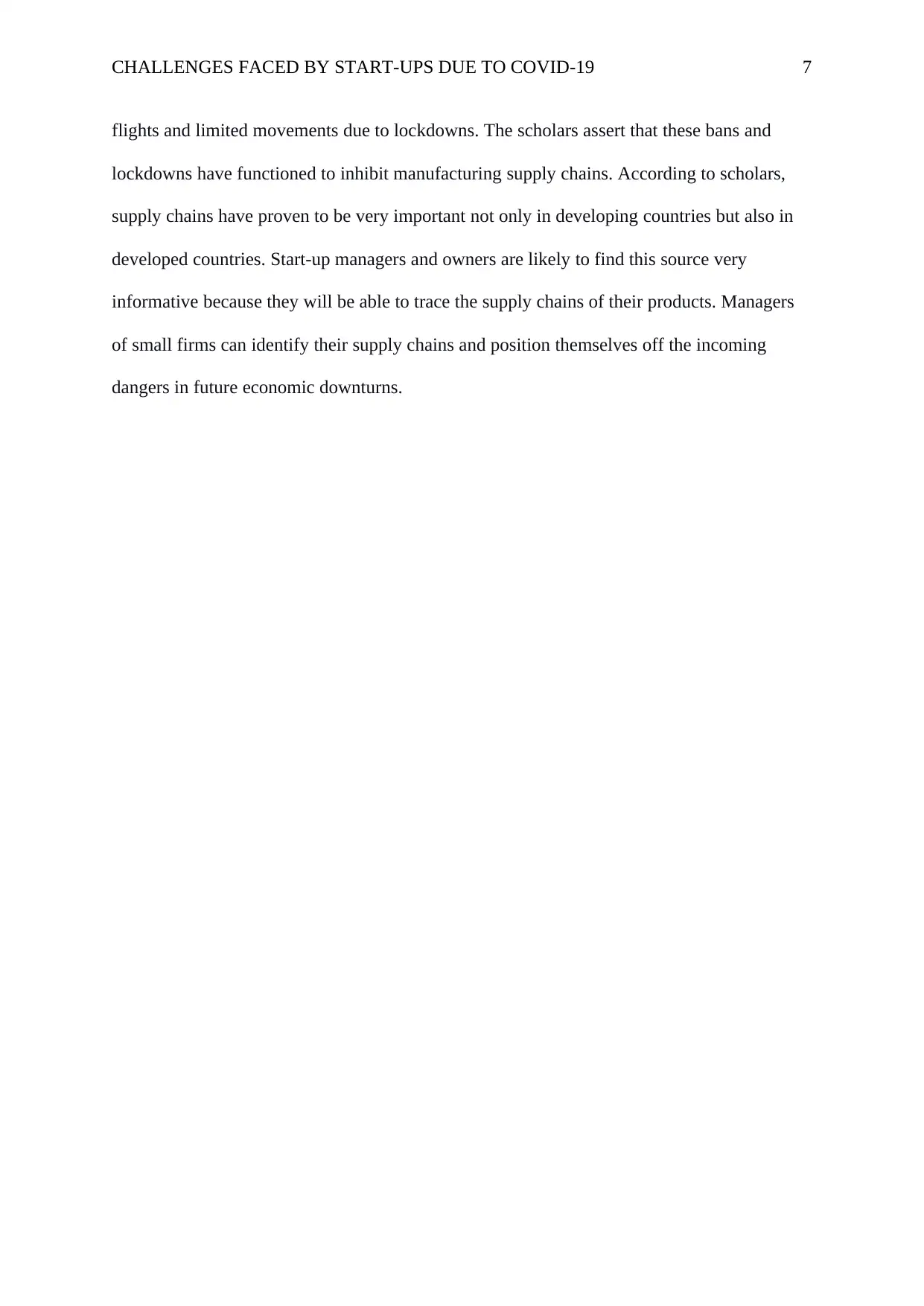
CHALLENGES FACED BY START-UPS DUE TO COVID-19 7
flights and limited movements due to lockdowns. The scholars assert that these bans and
lockdowns have functioned to inhibit manufacturing supply chains. According to scholars,
supply chains have proven to be very important not only in developing countries but also in
developed countries. Start-up managers and owners are likely to find this source very
informative because they will be able to trace the supply chains of their products. Managers
of small firms can identify their supply chains and position themselves off the incoming
dangers in future economic downturns.
flights and limited movements due to lockdowns. The scholars assert that these bans and
lockdowns have functioned to inhibit manufacturing supply chains. According to scholars,
supply chains have proven to be very important not only in developing countries but also in
developed countries. Start-up managers and owners are likely to find this source very
informative because they will be able to trace the supply chains of their products. Managers
of small firms can identify their supply chains and position themselves off the incoming
dangers in future economic downturns.
1 out of 7
Your All-in-One AI-Powered Toolkit for Academic Success.
+13062052269
info@desklib.com
Available 24*7 on WhatsApp / Email
![[object Object]](/_next/static/media/star-bottom.7253800d.svg)
Unlock your academic potential
Copyright © 2020–2026 A2Z Services. All Rights Reserved. Developed and managed by ZUCOL.

